
Catalog excerpts
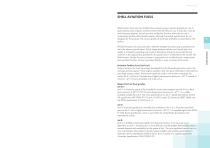
AVIATION FUELS SHELL AVIATION FUELS Shell Aviation fuels may be classified into two basic groups: aviation gasoline, for use in spark ignition piston engines; aviation turbine fuels (jet fuels), for use in turbo-fan, turbo jet and turbo-prop engines. Jet fuels are also certified by Aviation Authorities for use in compression ignition piston (diesel) engines, although the jet fuel specifications do not designed for this purpose. The various grades of each type available are described in this section. Aviation Turbine Fuel (Jet Fuel) Today’s kerosine ‘Jet’ fuels have been developed from the illuminating kerosine used in the early gas turbine engines. These engines needed a fuel with good combustion characteristics and ahigh energy content. The kerosine type fuels used in civil aviation nowadays are mainly Jet A-1 and Jet A. The latter has a higher freezing point (minimum –40°C instead of minimum –47°C) and is available only in the U.S.A. Major Civil Jet Fuel grades Jet A-1 Jet A-1 is a kerosine grade of fuel suitable for most turbine engined aircraft. It has a flash point minimum of 38°C (100°F) and a freeze point minimum of –47°C. It is widely available outside the U.S.A. The main specifications for Jet A-1 grade (see below) are the UK specification DEF STAN 91-91 (Jet A-1) NATO code F-35, (formerly DERD 2494) and the ASTM specification D 1655 (Jet A-1). Jet A Jet A is a kerosine grade fuel, normally only available in the U.S.A. It has the same flash point as Jet A-1 but a higher freeze point minimum (–40°C). It is supplied against the ASTM D 1655 (Jet A) specification. Jet A is used within the United States by domestic and international airlines. Jet B Jet B is a distillate comprising naphtha and kerosine fractions. It can be used as an alternative to Jet A-1, but because it is more difficult to handle (higher flammability), there is minimal demand and availability for this grade of fuel. The only significant area of use is in very cold climates, like northern Canada, where its better cold weather performance is important. Jet B is specified by ASTM D 6615, but in Canada it is supplied against the Canadian Specification CAN/CGSB 3.23 AVIATION FUELS All Shell Aviation fuels are produced to meet the stringent manufacturing requirements set out in the relevant specifications. At key stages between refinery and aircraft tank, fuel quality is checked by sampling and on-site or laboratory testing, to ensure that the fuel conforms to the requirements specified for the grade when it is delivered to the aircraft. The Shell Aviation Quality Assurance System is organised on a worldwide basis, made easier because Shell Aviation Service is provided directly in many countries o
Open the catalog to page 1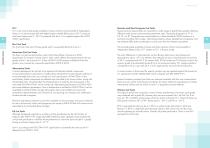
AVIATION FUELS TS-1 TS-1 is the main jet fuel grade available in Russia and the Commonwealth of Independent States. It is a kerosine type fuel with slightly higher volatility (flash point is 28°C minimum) and lower freeze point (<–50°C) compared with Jet A-1. It is supplied against the GOST 10227 specification. American Civil Jet Fuels The basic civil jet fuel specification used in the United States of America is ASTM Specification for Aviation Turbine Fuels D 1655, which defines the requirements for the two grades of fuel – Jet A and Jet A-1 (Note: ASTM D 1655 formerly included Jet B but...
Open the catalog to page 2
AVIATION FUELS The Check List is recognised by eight of the major aviation fuel suppliers - BP, Chevron, ENI, ExxonMobil, Kuwait Petroleum, Shell, Statoil and Total. Military Jet Fuel grades JP-4 JP-4 used to be the primary jet fuel for the US Air Force but was phased out in the 1990s because of safety problems. A few airforces around the world still use it but there is very little production. JP-4 is the military equivalent of Jet B with the addition of corrosion inhibitor and anti-icing additives; it meets the requirements of the U.S. Military Specification MIL-DTL-5624U Grade JP-4. The...
Open the catalog to page 3
AVIATION FUELS Avgas UL82 is dyed purple. Avgas UL87 This is a relatively new grade added to ASTM D6227, driven by the need for some light sport engines to have a higher octane fuel than Avgas UL82. Avgas UL82 is dyed yellow. Avgas UL91 Compositionally this grade is somewhat comparable with Avgas 100LL but with a zero lead content, which results in a lower octane rating of 91MON. Avgas UL91 is specified in ASTM D7547. Avgas UL91 differs principally from both Avgas UL87 and UL82 not only in the higher octane rating, but in lower vapour pressure (49kPa max compared with 60kPa max in ASTM...
Open the catalog to page 4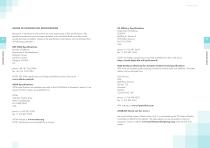
AVIATION FUELS AVIATION FUELS ACCESS TO AVIATION FUEL SPECIFICATIONS Because it is important to refer only to the most recent issues of fuel specifications, their detailed requirements have not been tabulated in this AeroShell Book since they could quickly become out-of-date. Copies of the specifications cited above can be obtained from the following authorities: DEF STAN Specifications Ministry of Defence Directorate of Standardisation Kentigern House 65 Brown Street Glasgow G2 8EX UK phone +44 141 224 2496 fax +44 141 224 2503 NOTE: DEF STAN specifications are freely available from their...
Open the catalog to page 5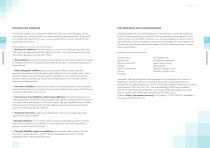
AVIATION FUELS AVIATION FUEL ADDITIVES Aviation fuel additives are compounds added to the fuel in very small quantities, usually measurable only in parts per million, to provide special or improved qualities. The quantity to be added and approval for its use in various grades of fuel is strictly controlled by the appropriate specifications. Fuel specifications do not list all the properties of aviation fuels; it would be impractical for them to do so because by no means all of these properties could be tested for at the creation of each new fuel batch. However, many of these properties not...
Open the catalog to page 6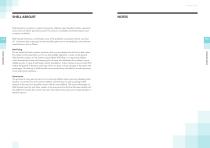
AVIATION FUELS SHELL AEROJET Shell AeroJet is a premium aviation fuel service, offering major benefits to pilots, operators and owners of turbine powered aircraft. The service is available at selected airports and countries worldwide. Shell AeroJet minimises or eliminates some of the problems associated with the use of Jet A-1 in business jets, turbo-prop aircraft and helicopters and is mandated by some airframe manufacturers such as Pilatus. Anti-Icing The air inside fuel tanks contains moisture which can precipitate into the fuel as free water. This water has the potential to turn to ice...
Open the catalog to page 7All Shell International Petroleum Company Ltd catalogs and technical brochures
-
AEROSHELL HYDRAULIC FLUIDS
19 Pages
-
AEROSHELL PISTON ENGINE OILS
16 Pages
-
AEROSHELL TURBINE ENGINE OILS
28 Pages
-
AEROSHELL GREASES
16 Pages





